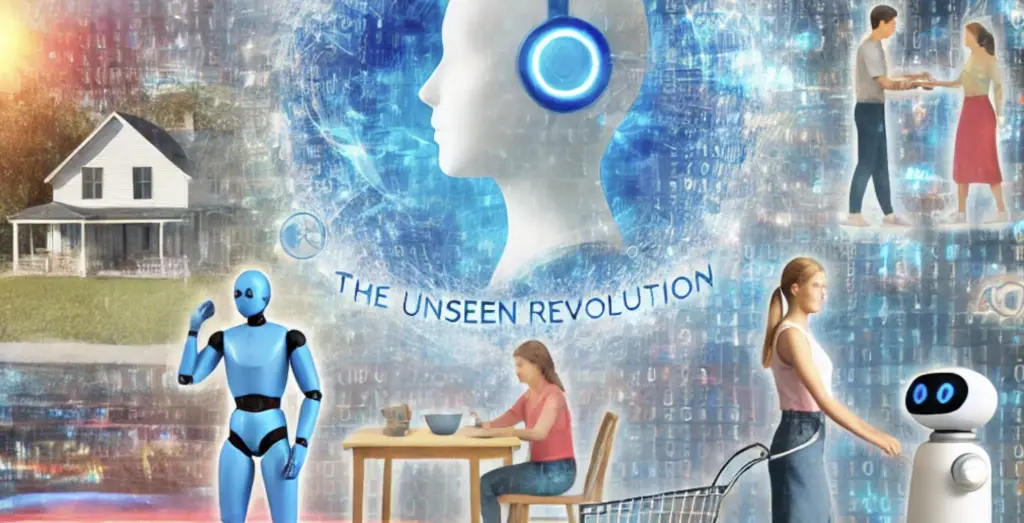
Introduction: The Dawn of a New Era
Artificial Intelligence (AI) is no longer a futuristic concept confined to the pages of sci-fi novels or tech conferences. It has seamlessly integrated into the fabric of our daily lives, changing the way we work, communicate, and make decisions. This quiet revolution has brought profound shifts, often in ways we barely notice. From virtual assistants in our homes to personalized shopping experiences, AI has made its way into almost every aspect of modern living.
1. The Home: AI-Powered Living Spaces
Step into any smart home, and you’ll find that AI has taken up residence in ways that redefine comfort and efficiency. Devices like Amazon Echo or Google Home have evolved from simple voice-activated assistants into multi-functional hubs capable of controlling lighting, thermostats, and even security cameras. These AI systems learn user preferences over time, creating tailored experiences that simplify daily routines—from adjusting the temperature when you wake up to reminding you about appointments or groceries.
Smart appliances are also making their mark. AI-driven refrigerators can monitor food freshness and suggest recipes based on what you have. AI-powered vacuum cleaners map and clean floors more effectively than ever before, and smart ovens can suggest cooking times and temperatures, ensuring perfectly baked dishes every time.
2. Personalized Experiences: From Shopping to Entertainment
One of the most significant ways AI has infiltrated our day-to-day lives is through personalized recommendations. Streaming platforms like Netflix and Spotify use sophisticated algorithms to analyze user behavior, suggesting shows, movies, or songs that match our preferences. This blend of data analysis and AI prediction makes the experience feel almost intuitive.
E-commerce platforms like Amazon and even smaller boutique sites harness AI for personalized shopping experiences. With AI algorithms, these platforms can anticipate user needs, showcasing products tailored to individual tastes and buying history. This personalization extends beyond products to customer service, where AI chatbots and virtual assistants handle questions and concerns instantly, learning from interactions to improve their support.
3. Transportation: The Road Ahead
AI is steering its way into the future of transportation, both figuratively and literally. While fully autonomous cars are still being perfected, AI technologies have already made driving safer. Lane assist systems, automatic braking, and adaptive cruise control are standard features in many modern vehicles, all powered by AI. These systems process data from sensors in real time, making split-second decisions that can prevent accidents and save lives.
Public transport and ride-hailing services have also benefited from AI integration. Predictive analytics improve scheduling, while algorithms ensure that routes are optimized for fuel efficiency and reduced congestion. Services like Uber and Lyft use AI to match riders with drivers quickly and efficiently, adapting to traffic patterns and real-time demand.
4. Health and Wellness: A Digital Helping Hand
AI is playing a pivotal role in personal health and wellness. Wearable devices like smartwatches and fitness trackers collect vast amounts of data on users’ activity levels, heart rates, and sleep patterns. AI processes this data to provide actionable insights, helping users improve their health. For example, algorithms can detect irregularities in heart rhythms and prompt users to seek medical advice before a potential issue escalates.
Healthcare providers are also leveraging AI for diagnostic purposes. Advanced algorithms can analyze medical images with remarkable accuracy, aiding in early detection of diseases like cancer. AI-powered apps and virtual assistants are making telemedicine more effective, allowing patients to describe symptoms and receive preliminary assessments without visiting a doctor’s office.
5. Communication and Work: The Digital Coworker
The way we work and communicate has been forever changed by AI. Tools like Grammarly assist users in writing, suggesting not just grammar corrections but tone adjustments and stylistic improvements. Video conferencing tools use AI to provide real-time transcription, background noise cancellation, and automatic translation, making global collaboration smoother than ever.
In professional environments, AI-driven analytics tools help businesses make data-driven decisions, optimize marketing strategies, and streamline operations. Automated scheduling assistants take the guesswork out of finding meeting times, while customer relationship management (CRM) platforms predict client needs and improve engagement.
6. The Ethical Frontier: Navigating Challenges
With all its benefits, AI also brings challenges and ethical considerations. Issues like data privacy, algorithmic bias, and job displacement need careful attention. While AI offers significant efficiency gains, it’s essential to ensure that these technologies are developed and deployed responsibly, with transparency and fairness at the forefront.
Conclusion: The Unseen Hand of AI
AI has woven itself into the fabric of our daily routines, enhancing convenience, safety, and personalization in subtle but impactful ways. As we look to the future, the challenge will be to continue integrating these advancements thoughtfully, ensuring they empower rather than alienate. The real magic of AI is not just in its complex algorithms or data-crunching power, but in how seamlessly it can augment human life, making the extraordinary feel ordinary.
Ready to see where AI takes us next? This journey has only just begun.